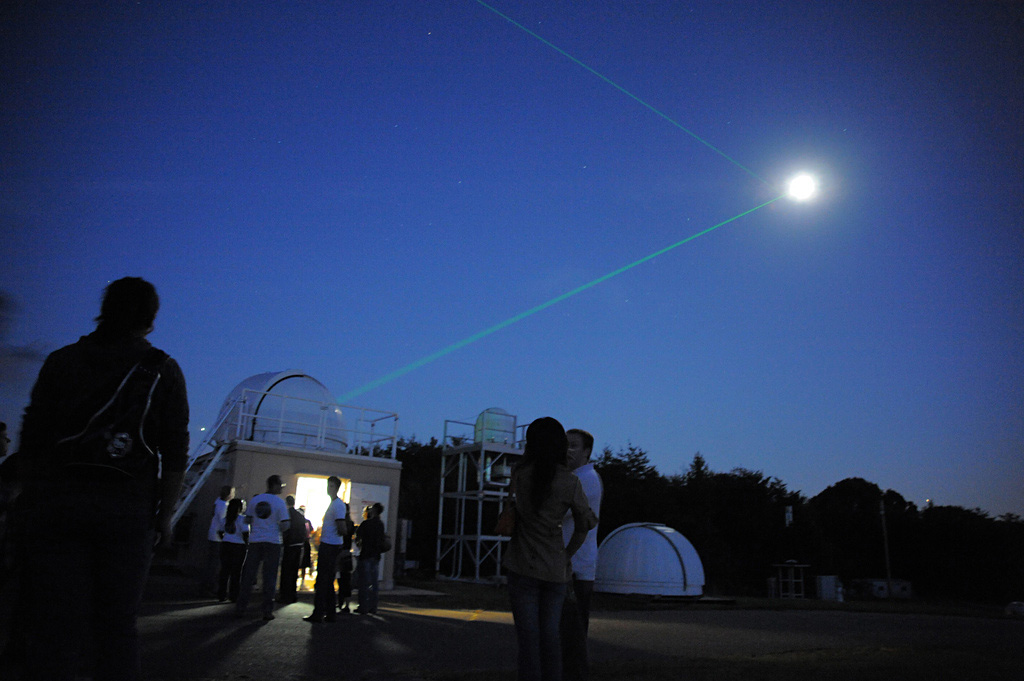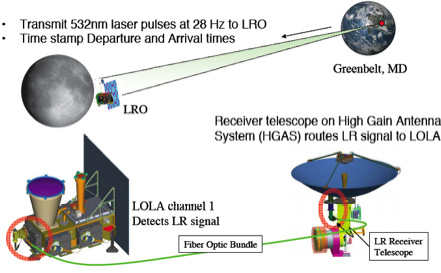Difference between revisions of "September 23, 2010"
| Line 6: | Line 6: | ||
<em>[http://www.flickr.com/photos/gsfc/5003421192/ Image] by Debbie McCallum [http://www.nasa.gov/centers/goddard/news/features/2010/moon-night.html NASA/GSFC]</em> Goddard's Laser Ranging Facility directs a laser toward the Lunar Reconassaince Orbiter on International Observe the Moon Night. (Sept 18, 2010)<br /> | <em>[http://www.flickr.com/photos/gsfc/5003421192/ Image] by Debbie McCallum [http://www.nasa.gov/centers/goddard/news/features/2010/moon-night.html NASA/GSFC]</em> Goddard's Laser Ranging Facility directs a laser toward the Lunar Reconassaince Orbiter on International Observe the Moon Night. (Sept 18, 2010)<br /> | ||
<br /> | <br /> | ||
| − | No, this is not deep sky observers answer to Moonlit nights! The picture above is not an attempt at blowing our Moon to smithereens to give month long darks skies, it is NASA Goddard pinging the LRO spacecraft with laser pulses on International Observe the Moon Night ([[September_16,_2010|InOMN]]). In this particular experiment above the LRO-Laser Ranging experment, the [ | + | No, this is not deep sky observers answer to Moonlit nights! The picture above is not an attempt at blowing our Moon to smithereens to give month long darks skies, it is NASA Goddard pinging the LRO spacecraft with laser pulses on International Observe the Moon Night ([[September_16,_2010|InOMN]]). In this particular experiment above the LRO-Laser Ranging experment, the [https://the-moon.us/wiki/LRO LRO spacecraft] [http://lunar.gsfc.nasa.gov/lola/index.html LOLA instrument] has a receiver pointed at Earth that detects the laser pulses and then feeds the data back to the ground along with the usual surface LOLA ping data. The purpose is to give an accurate position of the spacecraft in order to make a better map of the Moon from the LOLA surface pings. The laser pulses are sent up to LRO at 28 pulses per second, out of phase to the surface pings, using a less powerful laser than that needed for the surface retroreflectors so it can be conducted with smaller telescopes and more often, in some cases around the clock, whenever the Moon is visible. The laser beams are made visible by moisture in the atmosphere on humid nights.<br /> |
<br /> | <br /> | ||
[mailto:mauricejscollins@hotmail.com Maurice Collins]<br /> | [mailto:mauricejscollins@hotmail.com Maurice Collins]<br /> | ||
Latest revision as of 19:43, 18 August 2018
Shoot the Moon - InOMN

Image by Debbie McCallum NASA/GSFC Goddard's Laser Ranging Facility directs a laser toward the Lunar Reconassaince Orbiter on International Observe the Moon Night. (Sept 18, 2010)
No, this is not deep sky observers answer to Moonlit nights! The picture above is not an attempt at blowing our Moon to smithereens to give month long darks skies, it is NASA Goddard pinging the LRO spacecraft with laser pulses on International Observe the Moon Night (InOMN). In this particular experiment above the LRO-Laser Ranging experment, the LRO spacecraft LOLA instrument has a receiver pointed at Earth that detects the laser pulses and then feeds the data back to the ground along with the usual surface LOLA ping data. The purpose is to give an accurate position of the spacecraft in order to make a better map of the Moon from the LOLA surface pings. The laser pulses are sent up to LRO at 28 pulses per second, out of phase to the surface pings, using a less powerful laser than that needed for the surface retroreflectors so it can be conducted with smaller telescopes and more often, in some cases around the clock, whenever the Moon is visible. The laser beams are made visible by moisture in the atmosphere on humid nights.
Maurice Collins
Technical Details

Above is the concept behind how the LRO-LR experiment works.
Related Links
Background on LRO laser ranging
LRO-LR
Yesterday's LPOD: Megadome
Tomorrow's LPOD: On-Location At Langrenus
COMMENTS?
Register, Log in, and join in the comments.



